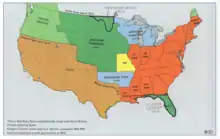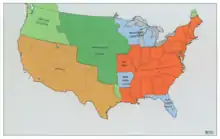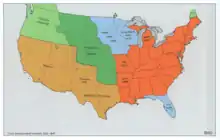Timeline of United States history (1820–1859)
This section of the Timeline of United States history concerns events from 1820 to 1859.
1820s
Presidency of James Monroe

U.S. territorial extent in 1820
- 1820 – Massachusetts divided in two with the admission of Maine as a state.
- 1820 – U.S. presidential election, 1820: James Monroe reelected president unopposed, Daniel D. Tompkins reelected vice president.
- 1821 – President Monroe and Vice President Tompkins begin second terms
- 1821 – Missouri becomes a state
- 1821 – Florida becomes a U.S. territory; the 1819 Adams–Onís Treaty goes into effect
- 1823 – Monroe Doctrine proclaimed
- 1824 – Gibbons v. Ogden (22 US 1 1824) affirms federal over state authority in interstate commerce. Gibbons' business partner is Cornelius Vanderbilt.
- 1824 – U.S. presidential election, 1824: Presidential results inconclusive. John C. Calhoun elected the vice president.
- 1825 – John Quincy Adams elected president by the House of Representatives;
Presidency of John Quincy Adams
- 1825 – Adams becomes the sixth President; John C. Calhoun, Vice President
- 1825 – Erie Canal is finally completed
- 1826 – Former presidents Thomas Jefferson and John Adams die on the same day, which happens to be on the fiftieth anniversary of the approval of the Declaration of independence.
- 1828 – U.S. presidential election, 1828: Andrew Jackson elected president; John C. Calhoun reelected vice president
- December 22, 1828 - First Lady-designate Rachel Jackson dies of a heart attack.
Presidency of Andrew Jackson
- 1829 – Andrew Jackson becomes the 7th President; Vice President Calhoun begins second term
1830s

U.S. territorial extent in 1830
- 1830s – Second Great Awakening is the religious revival movement
- 1830s – Oregon Trail which comes into use by settlers migrating to the Pacific Northwest
- 1830 – Indian Removal Act
- 1831 – Nat Turner's revolt
- 1831 – The Liberator begins publication in 1831
- 1831 – Cyrus McCormick invents the mechanical reaper
- 1831 – Petticoat affair (also known as the Eaton affair)
- 1832 – Worcester v. State of Georgia the Supreme Court rules in favor of Cherokees; President Jackson ignores the ruling
- 1832 – Maria Stewart is the first black American woman to give speech in front of a mixed audience
- 1832 – Black Hawk War
- 1832 – Tariff of 1832
- 1832 – Ordinance of Nullification passed by South Carolina
- 1832 – Department of Indian Affairs established
- 1832 – 1832 United States presidential election: Andrew Jackson reelected president; Martin Van Buren elected vice president
- 1832 – Jackson vetos the charter renewal of the Second Bank of the United States, bringing to a head the Bank War and ultimately leading to the Panic of 1837
- 1832 – John C. Calhoun resigns as vice president
- 1833 – The Force Bill expands presidential powers
- 1833 – President Jackson begins second term; Martin Van Buren becomes Vice President
- 1834 – Slavery debates at Lane Theological Seminary are one of the first major public discussions of the topic
- 1835 – Mexican President Santa Anna annuls the 1824 constitution, precipitating a civil war which spawns the Texas War for Independence.
- 1835 – Alexis de Tocqueville's Democracy in America published
- 1835 – Second Seminole War begins in Florida as members of the Seminole tribe resist relocation
- 1836 – Mexican President Santa Anna's army defeats Texas rebels at Battle of the Alamo
- 1836 - Santa Anna deposed after losing the Battle of San Jacinto and recognizing Texan independence.
- 1836 – Creek War of 1836
- 1836 – Samuel Colt invents the revolver
- 1836 – Original "gag rule" imposed when U.S. House of Representatives bars discussion of antislavery petitions
- 1836 – Specie Circular issued
- 1836 – Arkansas becomes a state
- 1836 – U.S. presidential election, 1836: Martin Van Buren elected president, no one is elected Vice President.
- 1837 - Richard M. Johnson elected vice president by the Senate.
Presidency of Martin Van Buren
- 1837 – Van Buren becomes the eighth President; Johnson, Vice President
- 1837 – U.S. recognizes the Republic of Texas
- 1837 – Caroline affair
- 1837 – Michigan becomes a state
- 1837 – Oberlin College begins enrolling female students, becoming first coeducational college in the U.S.
- 1837 – Panic of 1837
- 1837 – Charles River Bridge v. Warren Bridge reverses Dartmouth College v. Woodward: property rights can be overridden by public need
- 1838 – Forced removal of the Cherokee Nation from the southeastern U.S. leads to over 4,000 deaths in the Trail of Tears
- 1838 – Aroostook War
- 1839 – Amistad case
1840s

U.S. territorial extent in 1840
- 1840 – 1840 United States presidential election: William Henry Harrison is elected president; John Tyler is elected vice president
- 1841 – John Quincy Adams argues the Amistad Case before the Supreme Court
Presidency of William Henry Harrison (1841)
- March 4 – Harrison becomes the ninth President; Tyler, Vice President
- March 6 - Supreme Court finds for Amistad defendants. Freeing them.
- April 4 – President Harrison dies after only a month in office
Presidency of John Tyler
- April 6, 1841 - Vice President Tyler becomes the tenth President
- September 11, 1841 - Harrison's former cabinet resigns en masse. Only Daniel Webster remains.
- 1842 – Webster–Ashburton Treaty
- 1842 – The Dorr Rebellion: A civil war in Rhode Island
- 1843 – Attempt to impeach President Tyler fails
- 1844 – Oregon message
- 1844 – U.S. presidential election, 1844, James K. Polk is elected president; George M. Dallas is elected vice president
- 1845 – Texas annexation
Presidency of James K. Polk
- 1845 – Polk becomes the 11th President ; Dallas, Vice President
- 1845 – Florida and Texas become states
- 1846 – The U.S.–Mexican War begins
- 1846 - Bear Flag revolt in Alta California, which is momentarily independent.
- 1846 – Iowa becomes a state
- 1846 – Wilmot Proviso
- 1847 - Abraham Lincoln introduces himself to the world by his introduction of the Spot Resolutions in the House.
- 1848 – U.S. presidential election, 1848; Zachary Taylor is elected president; Millard Fillmore is elected vice president
- 1848 – Wisconsin becomes a state
- 1848 – The Treaty of Guadalupe Hidalgo ends the Mexican–American War
- 1848 – Dred Scott sues for his freedom
Presidency of Zachary Taylor
- 1849 – Taylor becomes the 12th President; Fillmore, Vice President
- 1849 – California Gold Rush begins
1850s
- 1850 – Clayton–Bulwer Treaty
- 1850 – President Taylor threatens to veto Compromise of 1850 even if it means Civil War.
- June 3–11 -The secessionist Nashville Convention held in Nashville, Tennessee.
Presidency of Millard Filmore
- July 9, 1850 – President Taylor dies, Vice President Fillmore becomes the 13th President
- September 9-20,1850 – The Compromise of 1850, including the notorious Fugitive Slave Act passed
- September 9, 1850 – California becomes a state
- November 1850 - Nashville Convention reconvenes; Satisfied with the Compromise, it declares the Union intact-for the moment.
- 1852 – U.S. presidential election, 1852: Franklin Pierce elected president; William R. King elected vice president
- 1853 – Commodore Matthew Perry opens Japan
Presidency of Franklin Pierce
- 1853 – Pierce becomes the 14th President; King, Vice President
- 1853 – Vice President King dies after only six weeks in office.
- 1853 – Gadsden Purchase from Mexico
- 1854 – Kansas–Nebraska Act; nullified Missouri Compromise
- 1854 – Ostend Manifesto
- 1854 – Whig Party collapses
- 1854 – Treaty of Kanagawa with Japan
- 1854 – Walker Expedition into Nicaragua
- 1855 – The Farmers' High School, which becomes Penn State University is founded.
- 1856 – Sack of Lawrence, Kansas
- 1856 – Pottawatomie massacre
- 1856 – Preston Brooks beats Charles Sumner with his walking stick on the steps of the U.S. Capitol building
- 1856 – U.S. presidential election, 1856: James Buchanan elected president; John C. Breckinridge, vice president
Presidency of James Buchanan
- 1857 – Buchanan becomes the 15th President; Breckinridge, Vice President
- 1857 – Dred Scott v. Sandford 60 US 393 1857 declares that slaves and blacks descended from slaves were not American citizens and cannot sue
- 1857 – Utah War
- 1857 – Lecompton Constitution rejected in Kansas Territory
- 1857 – Panic of 1857
- 1858 – Transatlantic cable laid
- 1858 – Minnesota becomes a state
- 1858 – Lincoln-Douglas Debates
- 1858 – U.S. is party to Treaty of Tientsin
- 1859 – John Brown's raid on Harpers Ferry
- 1859 – Comstock Lode discovered
See also
Further reading
1820s
- John S. Galbraith. "British-American Competition in the Border Fur Trade of the 1820s". Minnesota History, Vol. 36, No. 7 (Sep., 1959), pp. 241–249.
- Robert Henry Billigmeier and Fred Altschuler Picard, eds. The old land and the new : the journals of two Swiss families in America in the 1820s. Minneapolis : University of Minnesota Press, 1965.
- Merrill D Peterson. Democracy, liberty and property; the State Constitutional Conventions of the 1820s. Indianapolis, Bobbs-Merrill Co., 1966.
- Robert A. McCaughey. "From Town to City: Boston in the 1820s". Political Science Quarterly, Vol. 88, No. 2 (Jun., 1973), pp. 191–213.
- James Brewer Stewart. "Evangelicalism and the Radical Strain in Southern Antislavery Thought During the 1820s". The Journal of Southern History, Vol. 39, No. 3 (Aug., 1973), pp. 379–396.
- Anne M. Boylan. "Sunday Schools and Changing Evangelical Views of Children in the 1820s". Church History, Vol. 48, No. 3 (Sep., 1979), pp. 320–333
- Priscilla Ferguson Clement. "The Philadelphia Welfare Crisis of the 1820s". The Pennsylvania Magazine of History and Biography, Vol. 105, No. 2 (Apr., 1981), pp. 150–165.
- Barbara Cloud. "Oregon in the 1820s: The Congressional Perspective". The Western Historical Quarterly, Vol. 12, No. 2 (Apr., 1981), pp. 145–164.
- David J Russo. Keepers of our past : local historical writing in the United States, 1820s-1830s. New York : Greenwood Press, 1988.
- James L. Huston. Virtue Besieged: Virtue, "Equality, and the General Welfare in the Tariff Debates of the 1820s". Journal of the Early Republic, Vol. 14, No. 4 (Winter, 1994), pp. 523–547
- George A. Thompson, Jr. "Counterfeiter's Jargon of the 1820s". American Speech, Vol. 71, No. 3 (Autumn, 1996), pp. 334–335.
1830s
- Miguel Guelbenzu. "Gest's Recollections of Life in the Middle West in the 1830s". Indiana Magazine of History, Vol. 73, No. 2 (June 1977), pp. 125–142.
- William R. Swagerty. "A View from the Bottom Up: The Work Force of the American Fur Company on the Upper Missouri in the 1830s". Montana: The Magazine of Western History, Vol. 43, No. 1, Fur Trade Issue (Winter, 1993), pp. 18–33.
- Curtis D. Johnson. "Supply-Side and Demand-Side Revivalism? Evaluating the Social Influences on New York State Evangelism in the 1830s". Social Science History, Vol. 19, No. 1 (Spring, 1995), pp. 1–30.
- Mary Hershberger. "Mobilizing Women, Anticipating Abolition: The Struggle against Indian Removal in the 1830s". The Journal of American History, Vol. 86, No. 1 (Jun., 1999), pp. 15–40
- Christine MacDonald. "Judging Jurisdictions: Geography and Race in Slave Law and Literature of the 1830s". American Literature, Vol. 71, No. 4 (Dec., 1999), pp. 625–655.
1840s
- Ralph Mann. "Mountains, Land, and Kin Networks: Burkes Garden, Virginia, in the 1840s and 1850s". The Journal of Southern History, Vol. 58, No. 3 (Aug., 1992), pp. 411–434.
- Harlan D. Parker. "The Musical Cabinet: An Educational Journal of the Boston Area in the 1840s". Bulletin of the Council for Research in Music Education, No. 116 (Spring, 1993), pp. 51–60.
- John W. Quist. "The Great Majority of Our Subscribers Are Farmers": The Michigan Abolitionist Constituency of the 1840s. Journal of the Early Republic, Vol. 14, No. 3 (Autumn, 1994), pp. 325–358. also
- Raymond L. Cohn. "Nativism and the End of the Mass Migration of the 1840s and 1850s". The Journal of Economic History, Vol. 60, No. 2 (Jun., 2000), pp. 361–383.
- Patricia Junker. Thomas Cole's "Prometheus Bound:" An Allegory for the 1840s. American Art Journal, Vol. 31, No. 1/2 (2000), pp. 32–55.
- Ronald J. Zboray, Mary Saracino Zboray. "Gender Slurs in Boston's Partisan Press during the 1840s". Journal of American Studies, Vol. 34, No. 3, Part 1: Living in America: Recent and Contemporary Perspectives (Dec., 2000), pp. 413–446.
- Alice Taylor. "From Petitions to Partyism: Antislavery and the Domestication of Maine Politics in the 1840s and 1850s". The New England Quarterly, Vol. 77, No. 1 (Mar., 2004), pp. 70–88.
1850s
- P. L. Rainwater. "Economic Benefits of Secession: Opinions in Mississippi in the 1850s". The Journal of Southern History, Vol. 1, No. 4 (Nov., 1935), pp. 459–474.
- Christopher Hatch. "Music for America: A Critical Controversy of the 1850s". American Quarterly, Vol. 14, No. 4 (Winter, 1962), pp. 578–586.
- William W. Chenault, Robert C. Reinders. "The Northern-born Community of New Orleans in the 1850s". The Journal of American History, Vol. 51, No. 2 (Sep., 1964), pp. 232–24.
- Howard H. Bell. "Negro Nationalism in the 1850s". The Journal of Negro Education, Vol. 35, No. 1 (Winter, 1966), pp. 100–104.
- Jane H. Pease, William H. Pease. "Confrontation and Abolition in the 1850s". The Journal of American History, Vol. 58, No. 4 (Mar., 1972), pp. 923–937.
- Howard I. Kushner. "Visions of the Northwest Coast: Gwin and Seward in the 1850s". The Western Historical Quarterly, Vol. 4, No. 3 (Jul., 1973), pp. 295–306.
- Michael Fellman. "Theodore Parker and the Abolitionist Role in the 1850s". The Journal of American History, Vol. 61, No. 3 (Dec., 1974), pp. 666–684.
- Anne Firor Scott. "Women's Perspective on the Patriarchy in the 1850s". The Journal of American History, Vol. 61, No. 1 (Jun., 1974), pp. 52–64.
- James P. Morris. "An American First: Blood Transfusion in New Orleans in the 1850s". Louisiana History: The Journal of the Louisiana Historical Association, Vol. 16, No. 4 (Autumn, 1975), pp. 341–360.
- Marshall Scott Legan. "Railroad Sentiment in North Louisiana in the 1850s". Louisiana History: The Journal of the Louisiana Historical Association, Vol. 17, No. 2 (Spring, 1976), pp. 125–142.
- Carl Abbott. "Indianapolis in the 1850s: Popular Economic Thought and Urban Growth". Indiana Magazine of History, Vol. 74, No. 4 (December 1978), pp. 293–315.
- Dale Baum. "Know-Nothingism and the Republican Majority in Massachusetts: The Political Realignment of the 1850s". The Journal of American History, Vol. 64, No. 4 (Mar., 1978), pp. 959–986.
- Susan Jackson. "Movin' On: Mobility through Houston in the 1850s". The Southwestern Historical Quarterly, Vol. 81, No. 3 (Jan., 1978), pp. 251–282.
- Matilda W. Rice. "The 4th of July in the 1850s". Minnesota History, Vol. 49, No. 2 (Summer, 1984), pp. 54–55.
- Lori D. Ginzberg. "Moral Suasion Is Moral Balderdash: Women, Politics, and Social Activism in the 1850s". The Journal of American History, Vol. 73, No. 3 (Dec., 1986), pp. 601–622.
- Carla L. Peterson. ""Capitalism, Black (Under)Development, and the Production of the African-American Novel in the 1850s". American Literary History, Vol. 4, No. 4 (Winter, 1992), pp. 559–583.
- Marius M. Carriere Jr. "Anti-Catholicism, Nativism, and Louisiana Politics in the 1850s". Louisiana History: The Journal of the Louisiana Historical Association", Vol. 35, No. 4 (Autumn, 1994), pp. 455–474.
- Vincent J. Bertolini. "Fireside Chastity: The Erotics of Sentimental Bachelorhood in the 1850s". American Literature, Vol. 68, No. 4 (Dec., 1996), pp. 707–737.
- Larry Knight. "The Cart War: Defining American in San Antonio in the 1850s". The Southwestern Historical Quarterly, Vol. 109, No. 3 (Jan., 2006), pp. 319–336.
External links
This article is issued from Wikipedia. The text is licensed under Creative Commons - Attribution - Sharealike. Additional terms may apply for the media files.